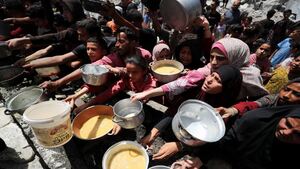The WFP urgently requires $44 million to provide full rations and restore cash assistance for 720 000 refugees through August. Without additional funds, in-kind food rations are expected to be cut to just 28% of daily needs in June, and all cash assistance will be suspended.
The number of refugees and asylum seekers in Kenya has surged by more than 70% over the past five years, rising from around 500 000 to 843 000, as conflict and climate shocks continue to drive displacement from neighboring countries such as Somalia and South Sudan.
The UN agency said it had previously adjusted rations in line with funding constraints, with the latest reduction in February providing only 40% of the recommended 2 100 kcal per person per day. During an interview with China Global Television Network (CGTN), Lauren Landis, the WFP country director for Kenya, spoke on Kenya's dire situation.
"We haven't been able to offer a 100% of our food basket for a very long time, many, many years. But in the past couple of years, we have had to move that food basket into 40% of a minimum recommended food basket. And now in June, for the first time, I think, in the history of both of the camps in Dadaab and Kakuma, we're going to have to go down to 28% of the recommended food basket. We have never been that low. So we can tell you what might be the impacts, but we have never seen the full impact. This is devastating," she said.
The situation has been made even worse with the significant reduction of funds allocated to the United States International Development Agency (USAID) by the President Donald Trump. In Kenya, USAID has actively supported a range of projects in agriculture, health, water and sanitation. Washington's decision to slash development aid to poor countries is expected to have a severe impact on Kenya, said Landis.
"But we have seen over time a reduction in donor interest. The real crisis this year was a severe reduction in the food aid of USAID. And we all know that story of the US, and they were the largest donor, up to 70% of that food basket came from the US. So, this has had a severe impact. And then, several other donors followed suit. And we already have severe cases of malnutrition in Kakuma, but the number of those cases will increase incredibly," she said.
--Reuters--













